Art Champlin Gold Medal Award 2017
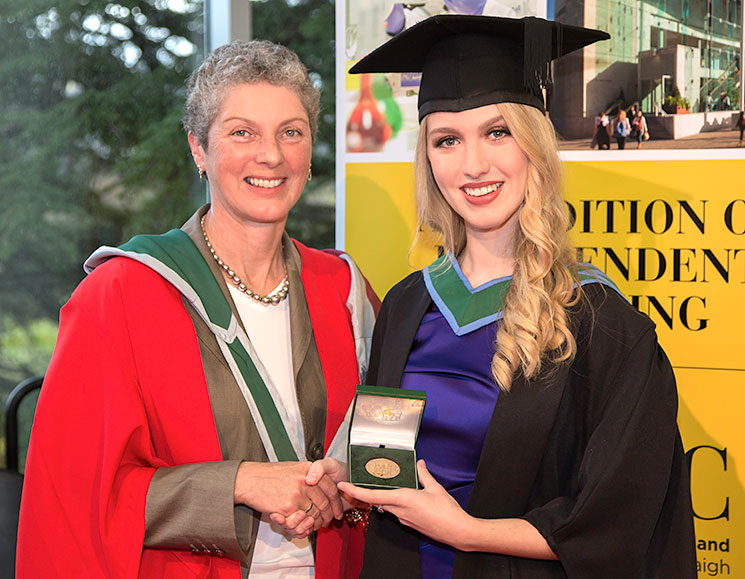
The Professor Art Champlin Gold medal award for academic excellence in Biochemistry, was presented to Carolyn Murray on Thursday October 19th by Professor Rosemary O’Connor of this School.
Carolyn graduated as the top student, with a first class honours degree in Biochemistry. Carolyn has been an outstanding student and is also the recipient of the Eli Lilly undergraduate award for academic excellence in Biochemistry and a Quercus College Scholarship in recognition of her exceptional results in Third Year Biochemistry.
Carolyn has commenced a two year Rotational Graduate Programme in Boston Scientific and we would like to wish Carolyn every success in her future career.
Carolyn's path to the Gold Medal...
I couldn’t imagine a course more suited to me than biochemistry. However, I did not know this when I was filling out my CAO over four years ago. To be honest, I got lucky and fell into the right course. As my time in secondary school came to a close I was still utterly clueless about how I wanted to spend the rest of my working life. Biological and Chemical Science was my top choice purely because I kind of liked leaving certificate biology, and it appealed to me that I could specialize further down the road (by which point I hoped I would have a better idea of what I would like to do).
From the beginning of university, I was always very determined to do the best I could and to gain as much experience as possible. I worked hard from the get go and managed to get a few awards under my belt over the years such as the title of University Scholar every year, the Eli Lilly Award for Academic Excellence, and the Quercus College Scholarship. Each summer I ensured I was working in a job that would give me relevant experience ranging from science outreach programs, laboratory maintenance and administration, and laboratory internships.
After first year, biology was the obvious choice for me. Second year provided a great opportunity to dabble in different fields of biology such as physiology, anatomy, neuroscience, microbiology and, of course, biochemistry. When it came to choosing which area of biology I wanted to continue studying into my third and fourth year, I was torn between biochemistry and microbiology. In hope of gaining some clarity and experience, I applied and successfully got accepted in APC Microbiome Institute Summer Studentship program. During my eight weeks of research in Professor Douwe Van Sinderen's laboratory, I gained invaluable experience in laboratory techniques such as gene cloning, PCR, plasmid purification, transformations and others. It was during this internship that my real love for science and curiosity developed. When the time came to choose what I wanted to continue studying into third year, although I was still torn between microbiology and biochemistry, I went with biochemistry, and I couldn't have chosen better.
Most of the modules in third and fourth year captivated me. Studying was never a real hardship as I was fascinated by the vast majority of the modules I was studying. I was genuinely curious to learn more, and frequently would find myself going off track and getting lost in papers while studying. The complexities of our bodies’ pathways intrigued me, and I always wanted to know more. I loved how what I was studying was so current and how any future jobs I would have would literally be saving lives. For me, my final year project was the best part of the four years. I completed my research project under Dr. Susan Joyce entitled “Bile Acid Diarrhoea In Crohn’s Disease – Diagnosis, Weight Differences And Pathophysiology”. Part of my project involved investigating possible causes of Bile Acid Diarrhoea (BAD) in Crohn's disease patients. This gave me the opportunity to throw myself into researching and staying up to date in a very defined topic. It also allowed me to see the value in what I was studying and the impact this work would have on the medical world in particular. As a result of my work on this project, a method for diagnosing BAD in Crohn's disease patients has been validated, and is now being utilized for diagnostics in Cork University Hospital.
My four years in university gave me invaluable experience and helped me grow into the woman that I am today. I am currently completing a two year Rotational Graduate Programme in Boston Scientific (curious to see what industry will hold for me) with the aim of completing a masters or PhD down the road. I can honeslty say that I had a fantastic four years, and I couldn't have had a nicer year group or more encouraging lecturers. I feel very lucky to have been fortunate enough to choose a course which I loved so much. “Your work is going to fill a large part of your life, and the only way to be truly satisfied is to do what you believe is great work. And the only way to do great work is to love what you do.” - Steve Jobs
Carolyn Murray, BSc Biochemistry 2017
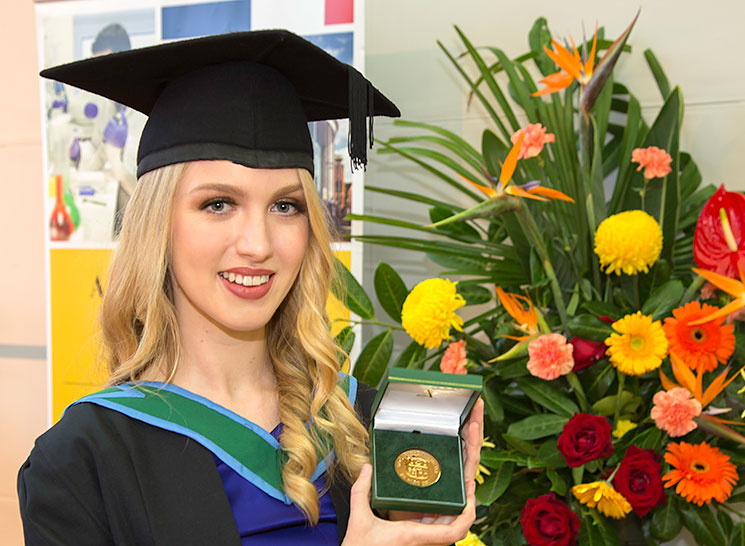
Carolyn Murray, the 2017 Art Champlin Gold Medal recipient & top BSc in Biochemistry graduate in 2017.
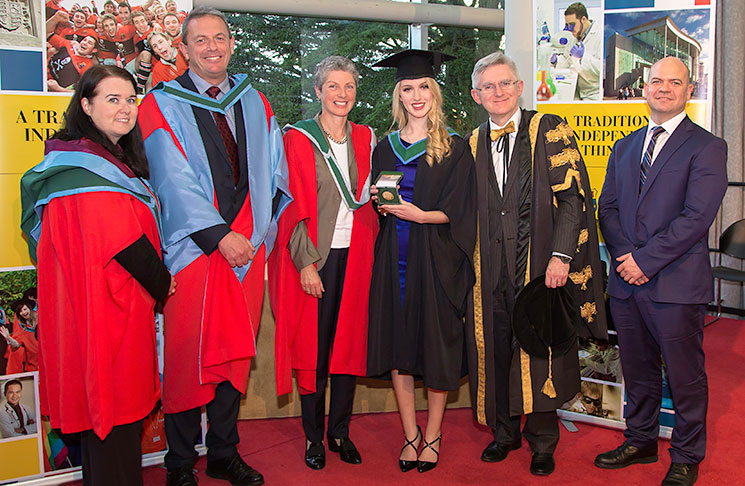
Dr Sinéad Kerins, School of Biochemistry and Cell Biology, University College Cork (UCC); Professor Paul Ross, Head of College College of Science, Engineering and Food Science, UCC; Professor Rosemary O’Connor, School of Biochemistry and Cell Biology, UCC; 2017 Art Champlin Gold Medal recipient & top BSc in Biochemistry graduate in 2017, Carolyn Murray; Professor Patrick O’Shea, 15th President of UCC; and Mr John Rea, Vice President Global Business Unit Leader, Health Division at DuPont Nutrition & Health, Cork, Ireland.
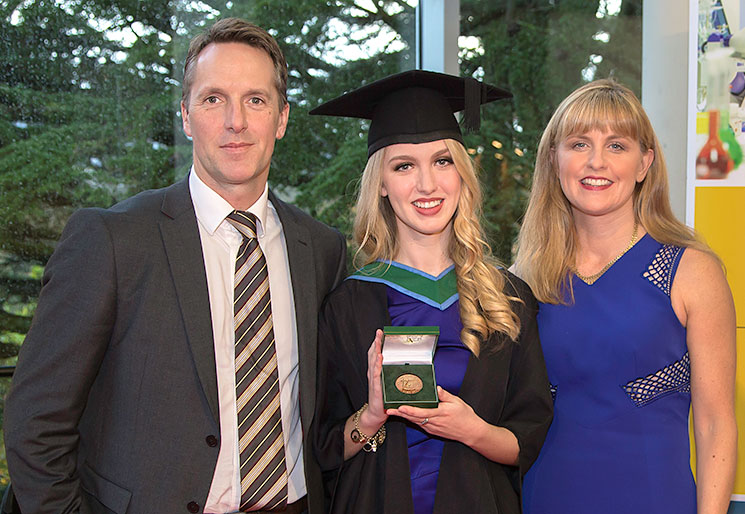
2017 Art Champlin Gold Medal recipient & top BSc in Biochemistry graduate in 2017, Carolyn Murray pictured with her parents, Kevin and Sharon Murray.
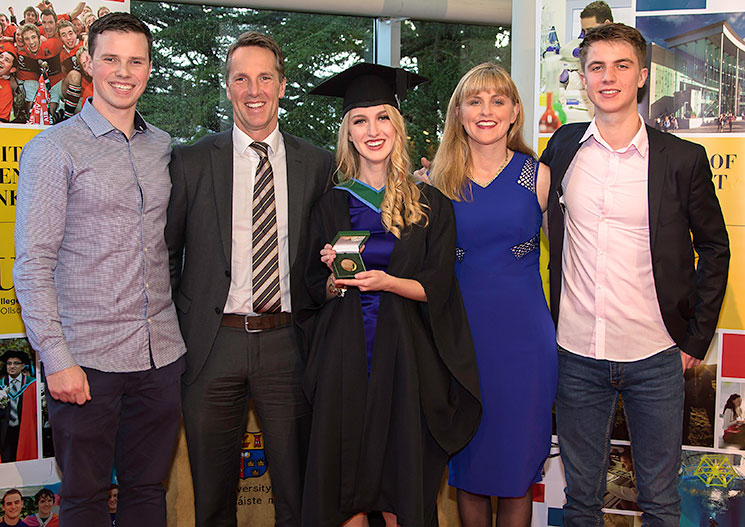
2017 Art Champlin Gold Medal recipient & top BSc in Biochemistry graduate in 2017, Carolyn Murray (centre) pictured with (from left): 2016 BSc in Biochemistry graduate, Daniel O’Regan; Carolyn’s father, Mr Kevin Murray; Carolyn’s mother, Mrs Sharon Murray; and Carolyn’s brother, Jack Murray.
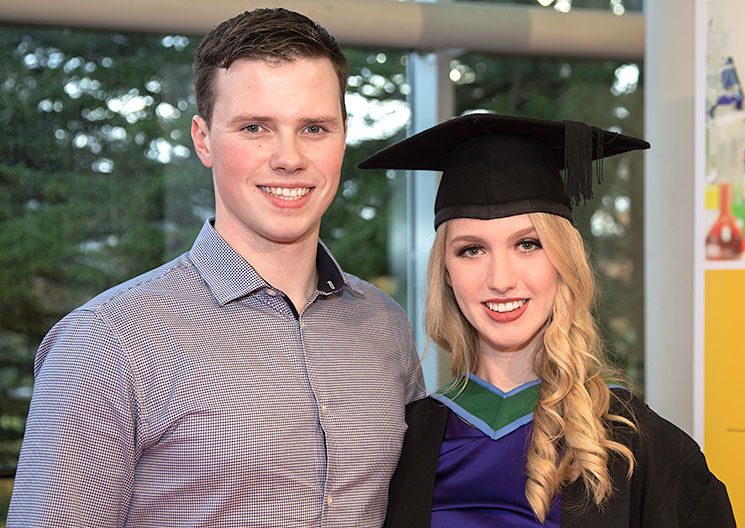
2016 BSc in Biochemistry graduate, Daniel O’Regan and 2017 Art Champlin Gold Medal recipient & top BSc in Biochemistry graduate in 2017, Carolyn Murray.
